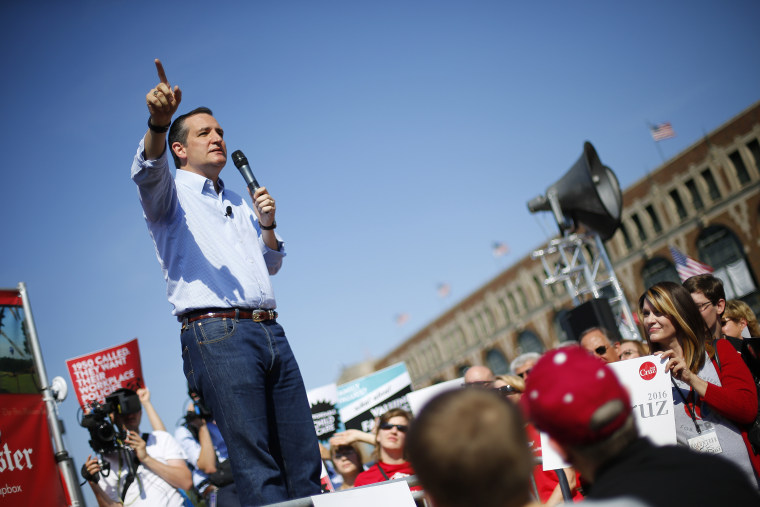It's difficult at this stage in the Republican presidential race to see Sen. Ted Cruz (R-Texas) as a top-tier contender. In the crowded field for the GOP nomination, Cruz is closer to the middle of the pack in most polling, and he has very little backing from the party establishment.
But the far-right senator's plan appears to be coming together, and it's fairly credible. Indeed, RedState's Erick Erickson, a prominent figure in Republican media,
said just last week that Cruz "has a very plausible path to the nomination."
Part of Cruz's strategy is clearly based on
cozying up to Donald Trump, and hoping to pick up many of his supporters if/when the GOP frontrunner falters before voters start showing up. If Trump benefits from positioning himself as an enemy of Republican insiders, Cruz can easily make the case that he's cut from the same cloth.
As Sen. Rand Paul's (R-Ky.) national ambitions appear increasingly unrealistic, Team Cruz also believes it can bring Paul's backers into the fold. Indeed, top officials on the Texan's team have
already begun "quietly reaching out to Rand Paul's early supporters and endorsers," making their case in one-on-one meetings.
Cruz also sees himself as a possible Tea Party favorite, and the Associated Press
reported Saturday that Cruz was "the hands-down favorite of an Americans for Prosperity gathering this weekend, if the number and volume of ovations during the speeches of five presidential candidates who addressed the summit of Tea Party activists was the measure."
But perhaps the biggest piece of the puzzle for the Republican senator is social conservatives and the religious right movement. MSNBC's Emma Margolin
reported yesterday:
Faced with stiff competition for the social conservative vote, Sen. Ted Cruz is kicking his assault on Planned Parenthood into high gear this week with the launch of an ambitious 50-state campaign to end taxpayer support for the women's health organization. The Texas lawmaker and Republican presidential candidate has invited 100,000 pastors to participate in a conference call Tuesday about how to defund Planned Parenthood.
Obviously, 100,000 pastors is an enormous group of faith leaders, many of whom will have no interest in backing Cruz. But the outreach is likely to pay at least some dividends, and it's part of a multi-faceted effort.
Consider the event in Iowa on Friday night, for example. The
Washington Post reported:
Cruz, looking to gain traction in an early voting state with a heavy concentration of evangelical Christians, held a highly organized and produced "Rally for Religious Liberty" Friday night. The rally featured live music, interviews with people who said their religious liberty was violated and sermon-like speeches from Cruz, who tried to cement himself as the candidate of choice for evangelical voters in a crowded Republican primary field. "There is a war on faith in America today," Cruz said, later noting that 54 million evangelical Christians stayed home during the 2012 election. "I'm here to tell you, we will stay home no longer," he said as the audience, which filled a ballroom and the campaign estimated to number 2,500 people, cheered.
Cruz even claims to have proof of the "war on faith": Dick and Betty Odgaard, who agreed to pay a $5,000 fine late last year after refusing to serve gay customers. The Odgaard family, Cruz insists, are "victims" of "government persecution" -- these innocent owners of a church, the senator insists, were punished by the state because of their faith.
As
Slate explained, the facts are a little different: "[T]hough Cruz repeatedly suggests the couple owns a church, in reality they own a
former church that they converted into an art gallery, flower shop, and bistro that they then ran as a wedding venue. So the Texan's taking some rather large liberties when he suggests that requiring the Odgaards to allow a gay couple to wed in their for-profit business would be the same as 'forcing a Muslim imam to conduct a Jewish wedding ceremony.'"
For the GOP presidential candidate, however, such details aren't nearly as important as roping social-conservative activists into his campaign operation.
